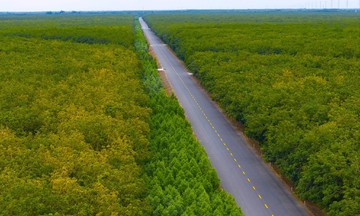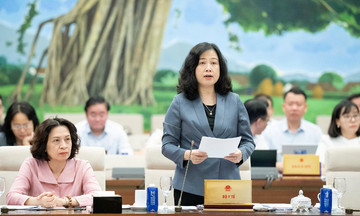Phuong's 4,000+ m2 duck farm in Phuoc An B hamlet, My Phuoc commune (My Tu district, Soc Trang), has become a popular destination for farmers seeking to learn wild duck farming techniques and purchase ducklings.
Before focusing on this model, Phuong tried various ventures, including freshwater fish farming, sea duck raising, and arrowhead cultivation, but none yielded significant returns. In 2015, inspired by a relative who experimented with ducklings from northern Vietnam, he began his own venture. He started with 40 wild ducks in a 400 m2 pond.
 |
Le Vu Phuong's wild duck breeding area is enclosed by netting. Photo: Chuc Ly |
Initially, due to his lack of experience, the ducks didn't thrive. Undeterred, Phuong visited various farms, sourcing ducklings from different suppliers. However, the survival rate remained low due to the stress of long-distance transportation and the ducks' difficulty adapting to the local environment.
In 2017, using his remaining ducks, Phuong attempted to hatch eggs to secure a consistent supply of ducklings. With support from the district and experts from Can Tho University, he persevered in his research. For four years, the hatching rate remained low, almost leading him to give up. After refining his techniques, he achieved an 80% hatching rate, which he has maintained for about 5 years.
According to Phuong, hatching wild duck eggs is more complex than hatching common duck eggs, involving precise turning, washing, and dipping. He now has three incubators, each handling an average of 7,000 eggs per batch. With 650 breeding ducks, he supplies approximately 3,500-4,000 ducklings monthly to customers in Can Tho, Ca Mau, and Vinh Long, priced at 12,000 dong each.
 |
Wild ducklings are currently sold by Phuong for 12,000 dong each, but demand still outstrips supply. Photo: Chuc Ly |
Beyond supplying ducklings, Phuong also provides technical guidance and guarantees the purchase of mature ducks from local farmers. Dozens of households in the region have joined his network, raising ducks for sale to restaurants and tourist destinations, with an output of around 2,000 ducks per month.
Phuong purchases mature ducks weighing 900 grams to one kg for 75,000-80,000 dong each. Prized for its firm, flavorful meat, wild duck is popular in restaurants, fetching a retail price of 350,000 dong per duck. Current production meets only about 30% of the market demand.
Wild ducks reach market weight in 55-60 days. At this stage, their wing feathers are not fully developed, preventing them from flying out of the enclosure. The survival rate is around 95%.
Farmers must keep the ducklings on dry land for the first three days, ensuring warmth without the need for lamps. Ducklings are initially fed rice and mixed feed, and after 15 days, they can forage naturally. With their hardy nature and strong resistance to disease, wild ducks require only about one-third the care of common ducks.
Raising a duck from hatching to sale costs about 25,000 dong, including duckling and feed costs. With a purchase price of 75,000-80,000 dong, farmers earn a profit of 40,000-50,000 dong per duck. Many households in the region have gained a stable income source through wild duck farming.
Adult wild ducks feed on rice, banana plants, shrimp, apple snails, and trash fish. To prevent disease, Phuong requires farmers to isolate and clean the ponds after each harvest. Netting is essential to enclose the farming area and prevent the ducks from escaping.
Wild ducks begin breeding at around 9 months old and continue for up to 5 years. They are most productive between the ages of 3 and 5, laying 11-12 eggs per clutch every 1.5-2 months. After 3-4 days, the eggs are incubated for 28 days. Phuong delivers a batch of 300-400 ducklings every three days.
 |
Phuong checks on a breeding wild duck. Photo: Chuc Ly |
By developing his breeding stock, Phuong has established a network of farmers, creating a closed loop from production to consumption. His family earns hundreds of millions of dong annually from supplying ducklings and selling mature ducks.
According to Phuong, the key to success lies in patience, mastering incubation techniques, adhering to proper duck care procedures, and securing stable market access. "The biggest challenge in farming is finding a market. When product sales are guaranteed, farmers feel confident to invest and commit long-term," he said.
Tran Ngoc Giang Nam, Vice Chairman of the My Phuoc Commune People's Committee (UBND), said the commune has encouraged wild duck farming since 2018, after observing successful models in neighboring provinces. The low-lying terrain of the region allows residents to utilize readily available trash fish as feed.
"Thanks to a reliable supply of ducklings and stable market access, this model has proven highly effective, inspiring many residents to expand their operations," Nam said.
Chuc Ly












